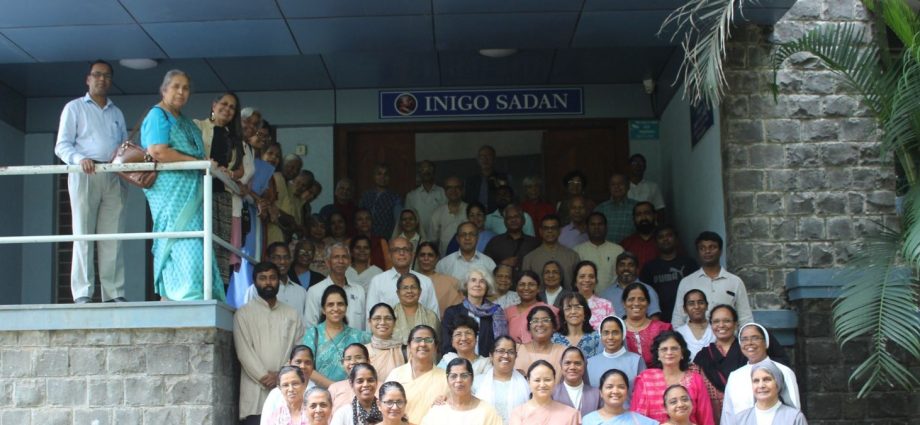
Pune, Sept 8, 2025
A total of 102 participants from across India gathered August 30-31 at Pune’s Jnana Deepa to address the implementation of the final document of the Synod on Synodality 2023–2024.
In addition, more than 200 people joined the dialogue at a public meeting on August 30 evening, to discuss pathways for implementing synodality.
The program was organized by Streevani in collaboration with Jnana Deepa, Ishvani Kendra, Montfort Social Institute, and the Conference of Religious Women of India.
The main guest speakers were SisterNathalie Becquart, undersecretary of the Synod of Bishops, and Apostolic Carmel Sister Maria Nirmalini, president of the Conference of Religious Women in India (CRWI).
The Synod on Synodality was convened to reflect and discern ways of carrying forward the paradigm shifts of the Second Vatican Council, re-examining how the participants understand themselves as Church, their identity as baptized Christians, and their mission.
They affirmed that as the people of God, with diverse charisms and gifts, they share co-responsibility for living as a synodal Church. This calls for two essential dimensions:
1. Spiritual Renewal
The Holy Spirit is the protagonist of the synodal way of being Church. Such a paradigm shift requires openness to listen and to be guided by the Spirit. Silence becomes a vital element in this listening process, particularly to hear voices that are often left unheard- women, youth, the poor, gender and sexual minorities, the marginalized, the abused, and those on the peripheries.
2. Structural Renewal
Structures must be renewed to foster encounters and collaborative discernment. Decision-making should be reshaped so that every voice is heard and respected, leading to dialogue, deliberate engagement, discernment and consensus. This alone can bring authentic harmony.
Pope Francis’ 2022 Apostolic Constitution Praedicate Evangelium (“Preach the Gospel”) makes a radical break with the historical link between ordination and positions of power in the Church, opening leadership roles to laity and religious across genders [PE 10].
The participants recognized the need for similar openness and flexibility in leadership appointments within the Indian Church. Such inclusiveness will make the Church participatory and transparent, ensuring that competent people contribute to its administration.
Through these renewals, the Church and all the faithful can experience a tangible synodal conversion—both individually and communally—deepening their commitment to walk in faith as missionary disciples at the domestic, local, and global levels.
The Way Forward
The following commitments are envisaged as personal and communal responsibilities:
- Form synodal teams at parish and diocesan levels to train, facilitate, promote, and accompany the People of God in adopting synodal ways of living within families, small Christian communities, parishes, institutions, and religious congregations.
- Prepare training modules for spiritual listening and conversations in the Spirit, leading to deliberative decision-making.
- Study Church documents to identify opportunities for women to assume leadership roles and actively advocate for their inclusion.
- Revisit and reform interpretations of scripture and documents that have historically legitimized injustice toward women and other genders.
- Train the faithful to reflect on the Final Synod Document and its guidelines Pathways for the Implementation Phase of the Synod (2025–2028), and adapt them to local contexts and needs.
- Deepen among the People of God an awareness of their baptismal identity and missionary mandate through catechesis and other forms of ongoing faith formation across all ages and groups.
- Create spaces to listen to silenced voices and integrate them into decision-making processes at domestic, local, diocesan, and national levels.
- Promote Small Christian Communities (SCCs) as instruments of a synodal Church, fostering listening, communion, participation, and mission at the grassroots.
- Encourage the use of synodal processes as pathways for peace and justice, beginning within our own communities and extending to the wider society.
- Collect and share stories of synodal living within the Church, with Christians of other denominations, people of other faiths, and all people of goodwill—showcasing best practices from the Church in India.
They committed to the synodal journey, recognizing that tensions are natural and must be approached with compassion and patience. Together, they resolved to work and walk side by side for a better world.
